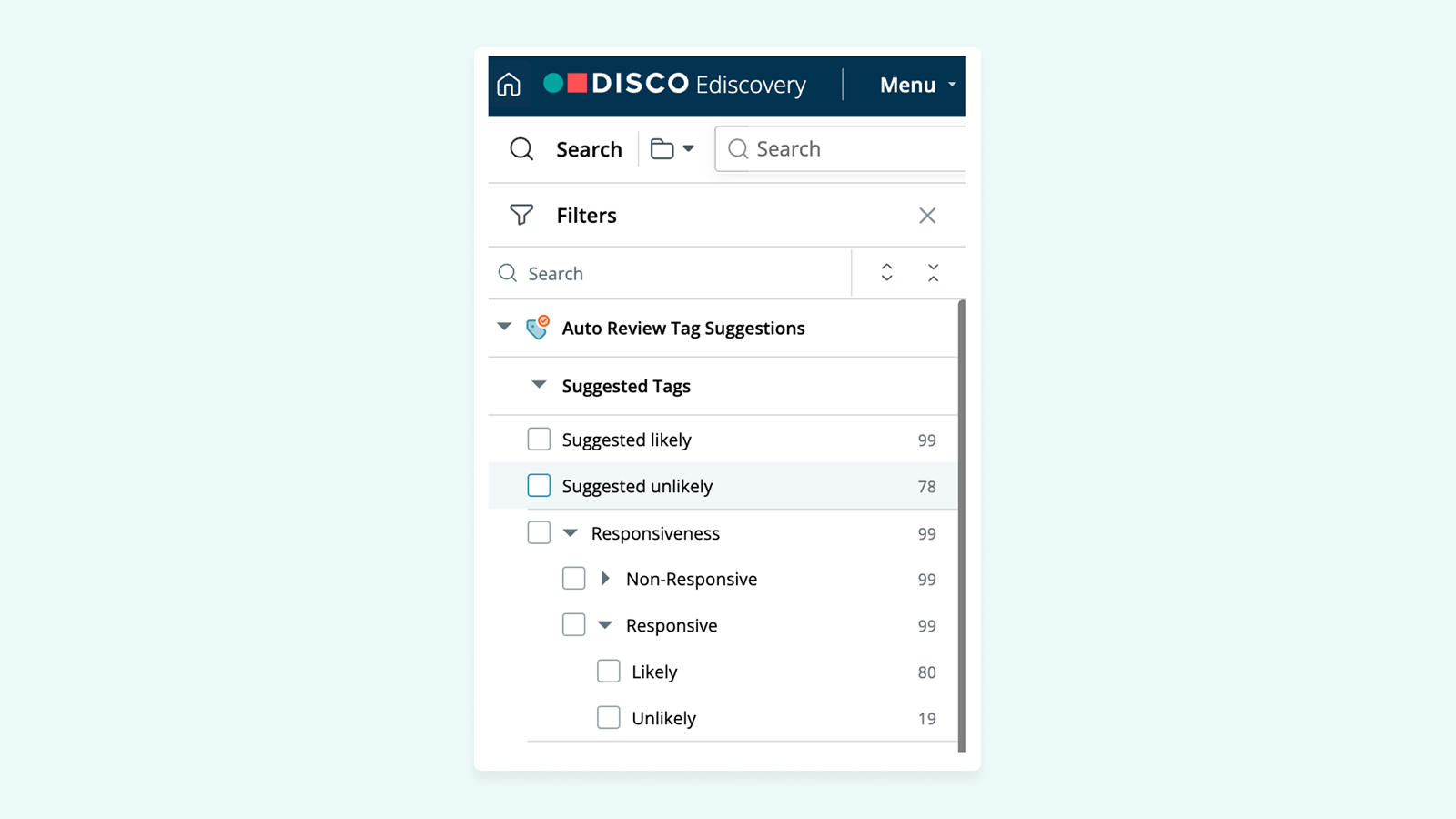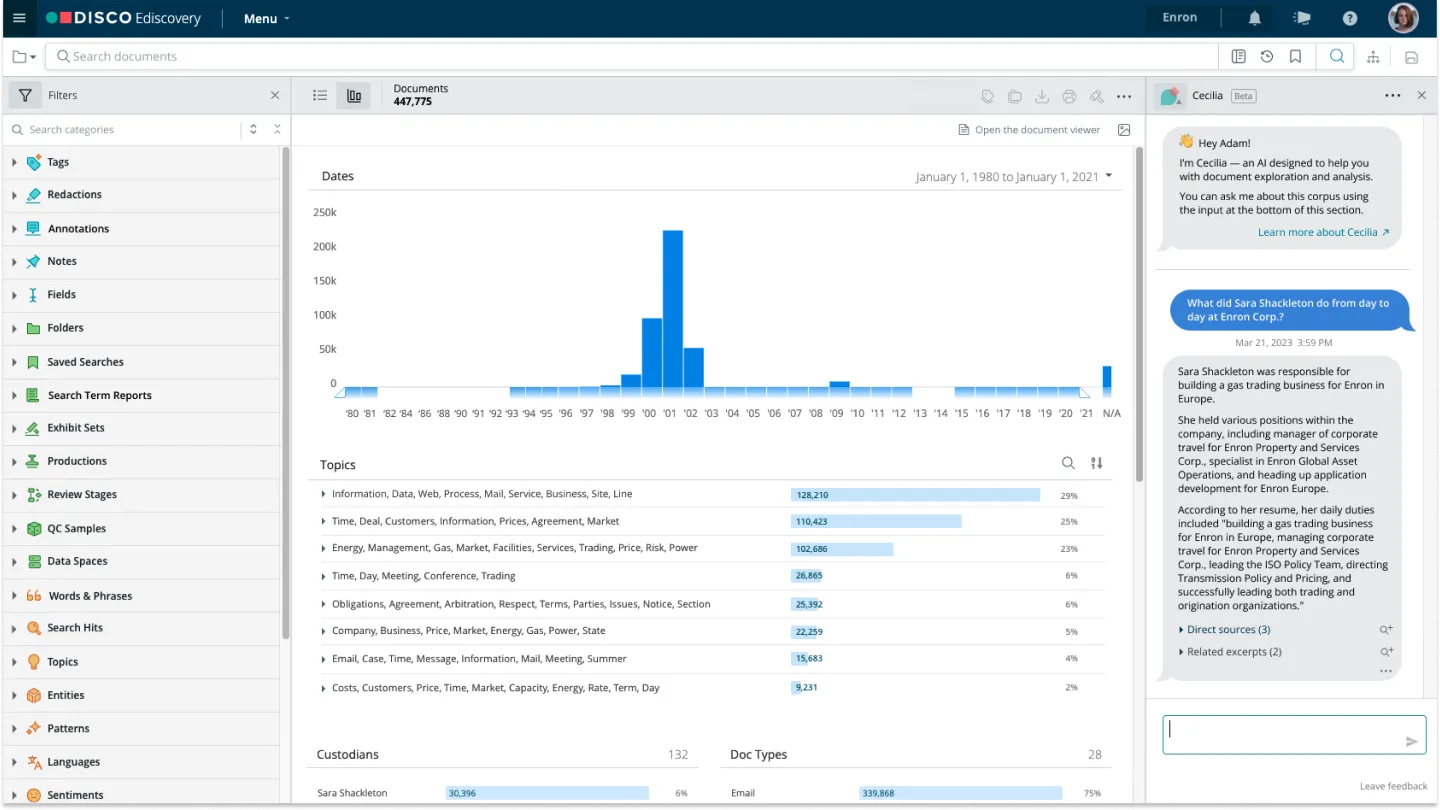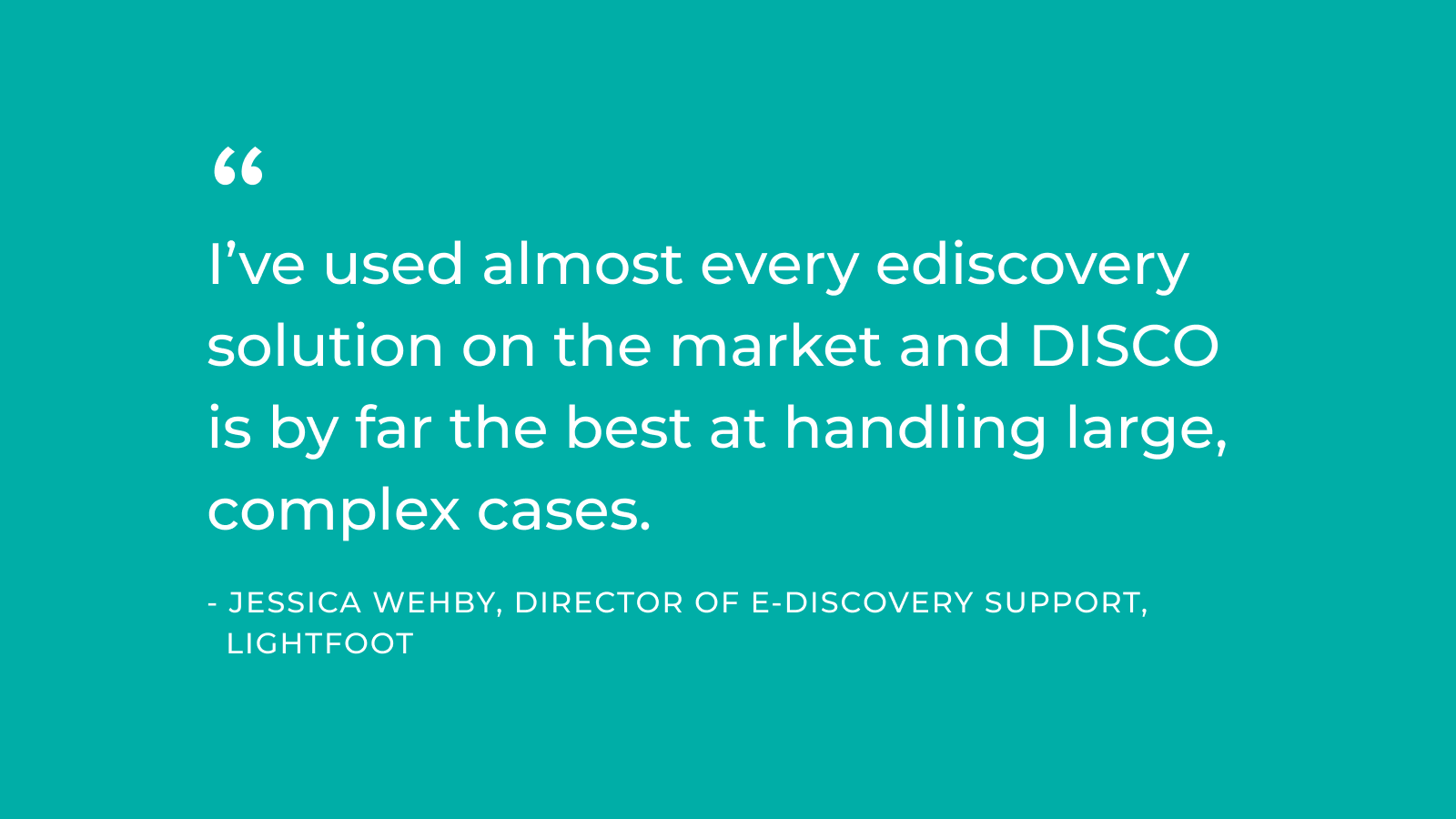⚡️ 1-Minute DISCO Download
At the crossroads of tradition and innovation, the legal industry is grappling with what the evolution of generative artificial intelligence (GenAI)—and large language models (LLMs) in particular—means for the profession.
If you are a legal professional wondering what GenAI means for your practice and your clients, you probably already have a sense that GenAI can create value – as well as some concerns. This article aims to illuminate some of those benefits, address some common questions, and propose a sample ethical framework for your organization to follow.
Generative AI in legal: Slow start, rapid adoption
The pace of GenAI adoption in the legal industry has been picking up dramatically. There are a few reasons why its uptake was initially slow but is now increasing exponentially.
First, as with many technologies, many businesses waited until enterprise-level technologies tailored to their industries became available.
Second, lawyers (including this article’s author) are a particularly conservative bunch. It’s understandable that we would want to first dip our toes in the water before committing to a new technology.
But we’ve seen that as more and more lawyers adopt GenAI, they are coming around to the same conclusion — GenAI-augmented legal practice creates real value for law firms and their clients.
When GenAI went mainstream with the launch of ChatGPT in 2022, many businesses — including law firms — were skeptical. They could see the potential of GenAI tools to transform their industries, but they understandably wanted enterprise-level solutions — not a chat box on a public website without data privacy or security guarantees.
Today, the technological landscape has evolved to the point where companies like DISCO can offer law firms GenAI solutions with the enterprise-level data privacy, security, scalability, and reliability that they expect and deserve.
In a 2023 survey by DISCO of 1,000 U.S. consumers, only 38% of respondents had used any GenAI tool for a work-related task over the previous six months, a stat that indicated significant room for adoption and growth. Concerns from users included privacy, bias, misinformation, and ethical implications around GenAI use and development.
Less than a year later, a 2024 DISCO survey of legal professionals showed that 72.5% of respondents already were using GenAI or planned to adopt it within the next two years. But while GenAI use has gone up, the concerns expressed in the prior survey haven’t disappeared. In the new survey, a majority of respondents continued to express apprehension about data privacy and security, as well as accuracy.
Despite these concerns, many expressed optimism that GenAI tools can streamline routine tasks and free up time for lawyers to be more strategic.
The better we understand the potential of GenAI and the concerns around ethics, privacy, and bias, the more effectively we can build trust, foster client confidence, and guide our clients on how to best embrace GenAI in legal practice. Below, I’ll address these ongoing concerns and offer strategies for legal professionals to have productive, enlightening conversations about GenAI with your clients.
The opportunities and challenges of GenAI use in law
Companies — particularly law firms and legal departments — must be proactive to ensure that GenAI is used ethically to benefit their clients.
A recent survey from Microsoft indicates that 75% of global employees are using GenAI at work, whether or not their workplaces have embraced it. More than half of those GenAI users reluctantly admit that they’re using so-called “BYOAI” (“Bring Your Own AI”) for their most important tasks.
This alone should send a message to companies that are still uncertain about GenAI: Employees are using it, with or without company guidance.
Why employees use AI for work, with or without company guidance
Efficiency
GenAI brings to the table a gamut of benefits, chief among them efficiency. Automation of routine tasks (such as acceleration of document reviews, and even initial drafts of legal work or correspondence) make GenAI an attractive proposition. DISCO’s Cecilia Q&A, for example, is capable of generating answers to queries within your ediscovery database, complete with citations to relevant supporting documents. It can be a game-changer for ediscovery work and finding key evidence, with customers seeing up to 87% in time savings – investigating questions and receiving answers within 15 minutes, vs. 2-3 hours using traditional workflows.
Data management
GenAI's data management capabilities are another major selling point. AI-driven tools can systematically organize, categorize, retrieve, and summarize information, thereby proving invaluable in areas like discovery, case management, and legal research. Cecilia doc summaries, which can quickly summarize lengthy documents, and Cecila depo summaries, providing three levels of summaries and classifications for (often very lengthy) deposition transcripts, are some examples of what is possible in this area.
Reduction of human error
Additionally, GenAI can enhance the accuracy of legal work by reducing human error. With its ability to process and analyze vast amounts of data accurately and quickly, errors due to human oversight or fatigue can be minimized. This not only ensures a higher standard of legal service, but also frees up attorneys to focus more on strategic advice and less on meticulous data analysis. Cecilia Auto Review, which can use GenAI to automate document review workflows or to augment quality control, is a great example of what can be done today in this regard.
The outstanding issues with AI in legal work
However, our surveys showed that challenges exist, including broader adoption, privacy, and ethical considerations. Who bears the responsibility for GenAI's actions or advice? This question emphasizes the necessity of an ethical framework for GenAI.
Data privacy and security
In a sector where confidentiality is sacrosanct, the majority of legal professionals need assurance that GenAI maintains this standard. In our 2024 survey of legal professionals, 74% of respondents expressed concerns about data privacy and security.
Concerns about bias
Potential bias in generative GenAI solutions is a concern we hear about often. GenAI systems learn from data — if that data is biased, the GenAI's outputs can be, too.
Respondents in our survey of legal professionals stated that accuracy (59%) and ethical concerns like bias and fairness (52%) were obstacles to implementing GenAI. Proactively addressing this issue through bias mitigation techniques, like human oversight, is critical. Humans play a crucial role in addressing bias.
To successfully adopt GenAI in the legal industry, it is essential to balance its transformative benefits with an understanding and acknowledgment of potential hurdles. Implementing a thorough ethical framework, proactively addressing privacy concerns, and ensuring bias mitigation can help us navigate the path to successful GenAI adoption in the legal industry.
Building an ethical framework for the use of AI in law: Key considerations
Responsible use of GenAI isn’t just good for business — it’s also an ethical imperative. In July 2024, the American Bar Association issued its first formal opinion on the use of GenAI. It emphasized lawyers’ duties of competence and confidentiality, noting that lawyers must use the “legal knowledge, skill, thoroughness, and preparation reasonably necessary for the representation” and keep client information confidential.
In other words, lawyers must educate themselves on best practices for ethical and effective advocacy with GenAI.
We suggest that your ethical framework includes the following core components:
Transparency: To demystify GenAI systems, consider creating a simplified flow chart or infographic that showcases how your GenAI tool processes and interprets data. Sharing this with your clients can build trust and address the perceived opacity of the GenAI “black box.”
Accountability: Establish a clear plan for accountability in the event of an error or GenAI hallucination. You could set up a "GenAI Accountability Committee" within your firm, which will underscore your commitment to accountability. Using dedicated legal GenAI with trustworthy training materials rather than publicly-available tools also can increase the accuracy of results.
Related: Our top tips for avoiding AI hallucinations. 💡
Privacy protection: Show your commitment to privacy by earning certifications like the ISO 27001, a recognized standard for information security, as well ISO 42001, a newly-established compliance standard for artificial intelligence management systems. Work with tech vendors who provide robust security measures and carefully vet any GenAI or LLM subprocessors, and consider hosting workshops or webinars to educate clients about your firm's privacy practices.
Conducting bias audits: Regular bias audits are vital to ensure GenAI tools uphold fairness in legal applications. Define metrics to detect disparities, such as uneven impacts on protected classes, and leverage independent auditors or tools for validation. Ensure that the vendors you’re working with use diverse data sets during training and update audits periodically to align with evolving legal standards. Transparently sharing audit outcomes reinforces your firm’s commitment to equity and responsible AI use in legal practice.
Following these proactive measures, including creating visual aids, forming an accountability committee, showcasing privacy certifications, working with secure tech vendors, organizing educational events, and conducting bias audits will not only build a robust ethical framework, but also offer tangible evidence of responsible GenAI development to your clients and stakeholders.
Practical steps for responsible, compliant AI adoption
Legal professionals can take several concrete steps to adopt GenAI responsibly in a way that aligns with the ethical framework we have discussed:
Stay informed: Acquaint yourself with GenAI, its potential applications in legal practice, and the risks that come along with it. Rely on resources like csdisco.com to stay updated on the latest movements in legal GenAI and stay on top of our feature updates. Knowledge is the cornerstone of responsible GenAI adoption and use.

Partner responsibly: When considering GenAI vendors, opt for those who prioritize transparency and robust security protocols, and offer a simple, streamlined support experience. Ensure any vendors and subprocessors are likewise vetted to ensure the vendors’ model training, data use, security policies, certifications, and standards meet yours and your clients’ needs. In short, your technology partners' commitment to ethical GenAI practices should be in alignment with your own.
Engage your clients: Embrace the conversation around GenAI with your clients. Inform them on how GenAI can augment your services, addressing concerns about privacy and bias by presenting your comprehensive ethical framework. While clients likely have similar concerns around confidentiality and other ethical issues, lawyers also should be prepared to address other client questions, like how using GenAI can make legal services more efficient and impact client budgets. In a world where clients can ask ChatGPT legal questions and get increasingly sophisticated answers, lawyers must be strategic partners with their clients and advocate for the benefits and safeguards of using enterprise-level solutions from trusted partners.
Related: Watch our on-demand webinar, Get Comfortable Defending AI Methodologies: A Masterclass 🎬
Embed ethics into your GenAI practices: Strive for transparency, accountability, and privacy in your everyday GenAI use. For instance, consider utilizing GenAI tools like Cecilia Q&A that provide detailed explanations for their output, thereby helping clients understand the logic behind GenAI-powered advice.
The adoption of GenAI in the legal sector won’t be a one-time event we’ll be able to point to in the calendar. It is an ongoing process and commitment. By staying informed, selecting ethical enterprise-ready technology partners, fostering open dialogues with your clients about GenAI, and incorporating ethics into your everyday GenAI practices, you can navigate the new world of GenAI responsibly and confidently.
Conclusion: Looking towards an ethical GenAI future
As we set our sights on the future, it's crucial to remember that integrating GenAI into the legal sector isn't just about leveraging innovative technology — it's also about meticulously considering the ethical implications and remaining dedicated to transparency and accountability. Striking a balance will be key to building trust and fostering successful GenAI integration.
For a more detailed analysis of consumer attitudes towards GenAI and a comprehensive discussion of potential ethical considerations, we recommend reviewing the complete findings of our 2023 and 2024 surveys.
And to continue the conversation about how secure, compliant AI can enable your firm to deliver better outcomes for your clients, reach out to DISCO – we’d love to answer your questions and take the discussion further.

.webp)




%20(1).jpeg)








